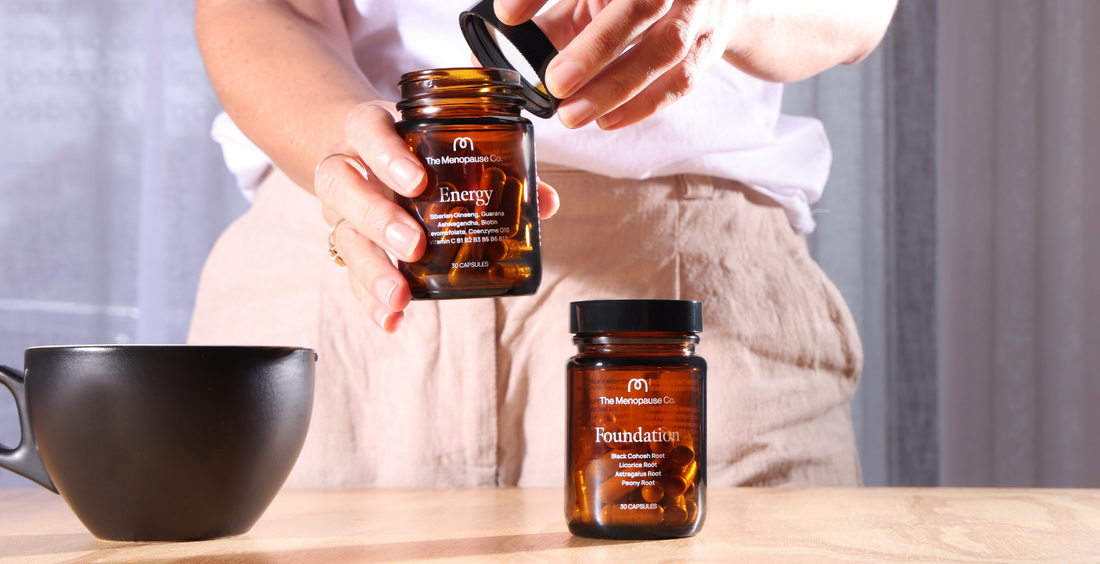
Low Menopause Energy? Boost Energy Naturally With These Ingredients
Share
Fatigue is one of the most common and disruptive symptoms experienced by around 80% of women during perimenopause and menopause. It can be relentless, make daily tasks feel overwhelming, and often results from a combination of hormonal changes, lifestyle shifts, stress, and nutrient deficiencies. If you’re seeking to combat fatigue with more than just caffeine, a carefully formulated supplement can offer the support you need.
In this article, we dive into the science-backed ingredients in our Energy supplement—each one carefully chosen to support and restore your vitality, boost your energy and help you feel more like yourself again.
Key ingredients to support energy and combat fatigue
Siberian Ginseng: A natural energy enhancer
Siberian Ginseng, a powerful adaptogen, has been used for centuries to support the body’s ability to adapt to physical and mental stress. Research shows that this herb helps reduce feelings of exhaustion and boosts overall energy levels. It works by enhancing the body’s resilience to stress, an important factor for menopausal women, who often experience both physical and mental fatigue due to hormonal changes.
Ashwagandha: Manage stress for steady energy
Ashwagandha is another renowned adaptogen that plays a vital role in managing cortisol levels—the body’s primary stress hormone. Elevated cortisol can contribute to fatigue and burnout, particularly during perimenopause and menopause when stress levels often spike. By helping regulate cortisol, Ashwagandha helps reduce stress and promotes a sense of calm - in addition, studies suggest that Ashwagandha also helps improve stamina and reduce fatigue, allowing for more stable energy throughout the day.
Guarana: A steady source of energy and focus
Guarana plays a key role in giving you an instant lift while supporting sustained energy in our Energy supplement. While it contains caffeine, its effects are more gradual and sustained compared to traditional stimulants like coffee. This is due to the presence of theobromine, which helps release energy slowly, ensuring a steady boost of vitality and mental clarity without the jitters or crashes.
Coenzyme Q10: Recharge your cells for lasting energy
Coenzyme Q10 (CoQ10) plays a critical role in energy production within the cells. This antioxidant is involved in the process of converting food into energy, particularly in the mitochondria—the powerhouse of the cell. As we age, CoQ10 levels naturally decline, contributing to decreased energy. By supplementing, you can replenish these levels and support cellular energy production.
Vitamin C: Support immune health and combat fatigue
Vitamin C is well-known for its immune-boosting properties, but it also plays a crucial role in energy production. It helps improve circulation, ensuring oxygen and nutrients are efficiently delivered throughout the body. Additionally, Vitamin C aids in iron absorption, which is vital for preventing fatigue.
Biotin: Essential for metabolism and energy
Biotin (Vitamin B7) is involved in the conversion of carbohydrates, fats, and proteins into usable energy. While it’s often associated with healthy hair and nails, its role in metabolism is just as important. Biotin supports your body’s ability to break down food and convert it into energy, ensuring that you feel more energised throughout the day.
The B Vitamins: Essential for energy production
B vitamins are the unsung heroes of energy production. Each vitamin in the B-complex group plays a role in converting the food you eat into energy at the cellular level.
- B1 (Thiamine): Helps convert carbohydrates into energy.
- B2 (Riboflavin): Supports efficient oxygen use in energy production.
- B3 (Niacin): Converts fats and carbohydrates into energy.
- B5 (Pantothenic Acid): Necessary for the synthesis of coenzyme A, which is essential for energy production.
- B6 (Pyridoxine): Helps the body use stored carbohydrates and proteins for energy.
- B12 (Cobalamin): Essential for the production of red blood cells, which help deliver oxygen and prevent fatigue.
Together, B vitamins work synergistically to support overall energy metabolism. Given that many women experience deficiencies in these vitamins during the menopause transition, supplementing with them can make a noticeable difference in how you feel day-to-day.
Folate (Vitamin B9): Boost energy and support vital functions
Folate, or Vitamin B9, plays a key role in producing red blood cells, which carry oxygen throughout your body. When red blood cell levels drop, it can lead to fatigue. Folate also supports the nervous system, helping regulate mood and cognition, which are often impacted by hormonal changes during menopause.
By maintaining healthy folate levels, you help your body convert food into energy more efficiently, reducing tiredness and boosting overall vitality.
Natural ingredients to boost energy and combat menopause fatigue
When combined, these ingredients work in harmony to address the root causes of fatigue, from hormonal imbalances to nutrient deficiencies. With a focus on sustained energy, they provide both an immediate lift and long-term support. Carefully selected for their individual benefits and how they complement each other, this formula nurtures your body’s natural vitality—so you can feel energised, clear, and balanced throughout the day, without relying on temporary fixes.
We have designed all of our products to be suitable for almost everyone, If you have any concerns about any medications you are already taking, we always recommend consulting with your doctor before starting any new supplements.
Shop Energy and save 15% every month on our subscriptions, knowing your supplements will arrive when you need them, stress-free.

Discover our range of evidence-based supplements, developed with mind and body nutrients to support your body and your needs before, during, and after this transitionary life stage.
This article has been reviewed by our expert advisory team.


